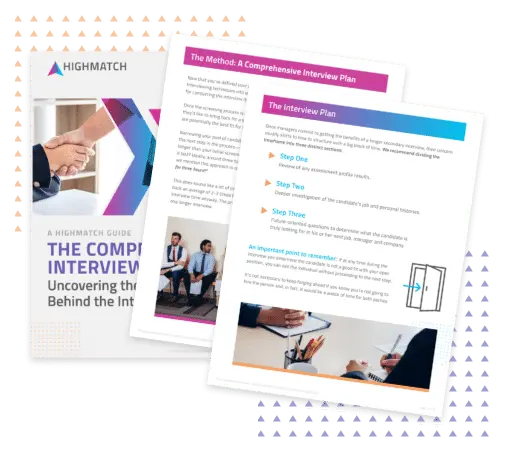You’ve created the perfect recruiting strategy. Your job postings are carefully written. Your career site highlights the driven-but-quirky culture at your company. You are targeting all the best job boards and career fairs to find great talent. Yet, you still aren’t hiring the best people. So what’s going wrong with your candidate recruitment?
It could be your hiring managers.
No matter how much effort your recruiting team puts into building a funnel of candidates, if managers don’t know how to interview, you end up with an ineffective candidate recruitment process. Too frequently, hiring managers conduct bad interviews.
It’s not their fault. Most people are promoted to management because they are great ‘doers.’ But being good at what you do doesn’t make you immune to conducting bad interviews! And while new managers often get training on how to manage teams, solve problems, and be effective leaders – teaching them how to properly perform candidate recruitment rarely makes the training to-do list. Instead, they are told they need to expand their teams quickly and left to figure out the rest on their own.
This means managers often go into interviews with no idea of what to do, which can lead them to make a number of mistakes. Hiring managers who conduct bad interviews may:
- Talk the whole time. This is a common scenario for untrained managers, who see the interview as an opportunity to talk up the company, and to sell the role and themselves to candidates. By the time they get to ask questions, they’ve already fed the interviewee so much information about the job they can frame their answers to exactly fit the position. Managers should limit how much they talk in an interview and give candidates a chance to tell them who they are, and why they think they will be a good fit for the job.
- Ask yes/no questions. An interview is meant to be a conversation filled with open-ended questions, anecdotes, and thoughtful stories shared by the interviewee. But when managers aren’t trained to interview, they often fall back on checklist style questions, like ‘do you know how to this type of software?’ ‘Have you ever lead a team?’ Or, ‘Can you see yourself in this role?’ Not only does this hinder the conversation, it makes it easy for candidates to guess the right answer.
- Fall too easily in love. We’ve all experienced an instant connection with a candidate who went to our alma mater, grew up in our hometown, or otherwise reminds us of the people we like to be around. Trained interviewers are taught to ignore this unconscious bias (or at least to try), so they can determine whether a candidate is really a good fit for the job. But a manager with no training isn’t equipped to recognize their own biases and may choose candidates for their appeal rather than their aptitude.
Pre-employment Tests Help
Pre-employment assessments help mitigate some of the frustration that recruiters face when hiring managers conduct bad interviews and fall for the wrong candidates. Unbiased quantifiable assessments give managers and recruiters data about the applicant’s skills and traits, which can be a useful framework for follow up conversations.
If a manager is in love with a candidate who has average assessment results, recruiters can use that data to help them re-consider their opinion. Conversely, if they dismiss a candidate whose assessment shows that they are a great fit, the data encourages them to give that candidate a second interview, possibly in a different setting, where their true attributes have a better chance to shine.
Assessment reports help teams affirm – or re-consider – their instincts about a candidate. Pre-employment tests are useful tools to validate what you think you know and to understand where their strengths and weaknesses are. HighMatch Reports also come with interview guides that provide questions tailored to each candidate, ensuring hiring managers ask the right questions, and properly assess risk factors.
Once you make a hiring decision, assessment reports help outline where a candidate will naturally excel and areas where there is room for growth. So you know what training and support they will need from day one.
Resources
To prevent bad interviews, all managers in a position to hire should be trained in how to interview. For quick tips and guidance on how to conduct an effective behavioral interview, check out:
HighMatch’s Comprehensive Interview Guide
FitSmallBusiness’ Free Behavioral Interview Template





